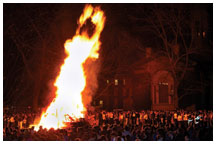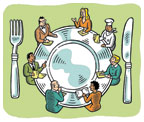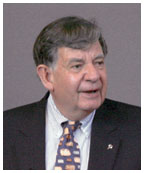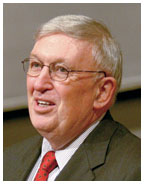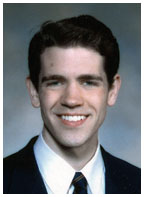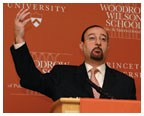
|
December 13, 2006: Notebook
For alumni, a chance to weigh in on diversity
Elections bring mixed results for alumni candidates
Applicant, rejected by Princeton, files complaint of anti-Asian bias
U.N.’s role in Mideast debated as WWS launches N.Y. lectures
|
(Photo by Bill Allen ’79–NJ Sport/Action. ) |
Flames soared skyward Nov. 17 as Princeton celebrated the traditional bonfire that follows football victories over Harvard and Yale. “It’s been 12 long years since we lit a match on Cannon Green, but you guys made it happen,” President Tilghman told members of the football team gathered on the steps of Clio Hall. An estimated 2,000 people attended to cheer on the Tigers the night before their season-ending win over Dartmouth that clinched a tie for the Ivy League title.
For
a video clip of the bonfire, click here.
![]()

(Illustration by Ron Barrett) |
Most Americans think of their meals in terms of taste, cost, and nutrition, but according to Professor Peter Singer, food choices are rife with bioethical questions as well. Singer joined authors Eric Schlosser ’81 and Michael Pollan and several other presenters to examine food in the context of ethics, economics, psychology, politics, and environmental science at “Food, Ethics, and the Environment,” a conference held Nov. 16 and 17 at Richardson Auditorium.
Schlosser, author of the book Fast Food Nation and co-writer of a film by the same name that opened Nov. 17, said that while the conference’s nearly 1,000 participants showed that interest in the social and ethical implications of food is growing, the power of conscientious individuals has limits. “What we buy can make a difference, but the idea of changing the world by what you buy can only go so far,” Schlosser said in the conference’s opening session. “What’s been missing from the dialogue for the last 25 years is corporate responsibility and collective responsibility.”
The next day, a representative of McDonald’s, the object of some of Schlosser’s sharpest criticism, spoke about the fast-food chain’s efforts to build a “socially responsible supply chain.” Members of the audience seemed unimpressed in the question-and-answer session, asking whether McDonald’s had used its leverage constructively, particularly in the marketplace for meats.
Alumni in addition to Schlosser played a significant role in the conference. Becky Goldburg ’80, a senior scientist for Environmental Defense, spoke about the environmental damage caused by aquaculture, or fish farming, and Rita Hindin ’75, a public-health consultant, moderated a panel that addressed food marketing and local farming. Bill Andersen ’81, who owns an organic farm in Pennsylvania, spoke about the challenges of building distribution channels for local produce.
With a wide range of expertise, the panelists critiqued several major issues in food production, marketing, and consumption, but the ethical questions they raised seemed most telling when applied to the choices consumers make each day: Are organic strawberries still worth buying when one pauses to consider the fossil fuels spent by shipping them from Chile to the United States? Will buying a bag of carrots that features cartoon characters teach children to eat healthily, or will it steer them toward cartoon-adorned junk food?
Pollan, author of The Omnivore’s Dilemma, tried to examine
several sides of each issue in one of the conference’s final sessions.
“There is no single ethical framework that can navigate all the
dilemmas we’ve looked at — energy, animal rights and welfare,
the health of the land,” he said. “I think we should get used
to the fact that there’s going to be a kind of pluralism to our
ethics of eating.” ![]()
By B.T.

Two emeritus professors at Princeton — Robert Fagles, a renowned translator of Greek classics, and Bernard Lewis, a leading authority on the Middle East — were awarded the NATIONAL HUMANITIES MEDAL by President Bush in November. They were among 10 recipients this year.
Fagles, the Arthur W. Marks ’19 Professor of Comparative Literature, emeritus, is widely acclaimed for his popular translations of classics by Homer, Sophocles, and Virgil. He joined the faculty in 1960 and was founding chairman of the comparative literature department, retiring in 2002.
Lewis, the Cleveland E. Dodge Professor of Near Eastern Studies, emeritus, is known for research that encompasses the entire Islamic world from the medieval to the current periods, major contributions to classical Islamic history, Ottoman and Turkish history, and modern Near Eastern studies. He joined the faculty in 1974 and retired in 1986.
YING-SHIH YU, the Gordon Wu ’58 Professor of Chinese Studies, emeritus, this month received the John W. Kluge Prize for lifetime achievement in the study of humanity for his pioneering work on the role of Chinese history, thought, and culture. Yu shared the award with John Hope Franklin, professor emeritus at Duke University, and each was to receive half of the $1 million prize.
A world authority on the Tang Dynasty, Yu has published research spanning 2,000 years of Chinese history, including about 30 books. He is also known for supporting the democracy movement in China. Yu joined the Princeton faculty in 1987 and retired in 2001.
Elisabeth Dorman has been named the University’s new DIRECTOR
OF GRADUATE ALUMNI RELATIONS, succeeding Alyssa Miksis, who recently
moved to Princeton’s development office. Dorman has worked in alumni
relations and development at Stanford University.
![]()

Former president William G. Bowen *58 recounted Princeton’s diversity efforts at an alumni conference. (Beverly Schaefer) |
For alumni, a chance to weigh in on diversity
More than 360 alumni and guests returned to campus last month for a conference on “race and community,” where they heard reports on how Princeton is faring in attempts to diversify the student body and faculty and to improve the environment for students who enroll. The conference’s verdict: Princeton has made great strides, through much remains to be done.
Many returning alumni were members of minority groups who have not had a strong connection to Princeton, said Margaret Moore Miller ’80, director of the Alumni Council. They were drawn by events ranging from panels on topics like “Politics and Race” and “Diversity in Higher Education” to performances by student groups and actor-writer Joe Hernandez-Kolski ’96’s “Refried Latino Pride (the Princeton Remix).”
The gathering was “a powerful reaffirmation ... of not forgetting where we have come from as we focus on what is so clearly an unfinished
agenda,” said former president William G. Bowen *58 in his opening address. Though speakers noted that the freshman class is the most diverse in Princeton’s history, with racial minorities making up 37 percent of the Class of 2010, some spoke about the slow progress being made in recruiting students from low-income families.
“We are a failure at serving as a base for social mobility,” said professor Miguel Centeno, who helped design a Princeton program to prepare low-income high school students for college. Only 10 percent of Princeton undergraduates come from families in the bottom half of the income scale, he said, adding, “It is easier to find a black or Latino student than a poor student.”
President Tilghman addressed a similar theme, saying that Princeton has no public responsibility that is more important “than opportunity and the creation of social mobility, particularly in the country and the world where the gap between the rich and the poor is getting wider every day.” Dean of Admission Janet Rapelye said that Princeton’s pioneering no-loan financial aid program creates a responsibility “especially to find students from lower socioeconomic backgrounds.”
While alumni expressed support of the University’s expanded financial aid program and efforts to make the student body more diverse, several spoke of the challenges that students from lower socioeconomic backgrounds might face in integrating into Princeton’s social environment. Others wondered whether Princeton could make a dent in the national issue of social mobility.
“You could infer from [Tilghman’s] talk that Princeton is actually trying to create social mobility and opportunity that will have an impact on the gap between the rich and poor in this country,” said Franklin Odo ’61, a curator at the National Museum of American History in Washington, D.C. “I don’t see how that works.”
University trustee Y.S. Chi ’83, a publisher in New York City, praised the opportunity for direct dialogue between the alumni and the administration. He noted that Princeton is still perceived by some as “white, male, and wealthy,” and said alumni must be better ambassadors “for all the good things that we are doing.”
The conference was sponsored by the University along with the Association
of Black Princeton Alumni, the Asian American Alumni Association of Princeton,
the Association of Latino Princeton Alumni, and Native Americans at Princeton.
It was the second major conference on racial issues this semester, following
an event targeted toward African-American alumni in September. ![]()
By Alex Gennis ’09

(Steven Veach) |
Sharp papas
Fatherhood can enhance brain activity, at least in one species of monkeys,
according to a recent Nature Neuroscience article by Ph.D. student Yevgenia
Kozorovitskiy, psychology professor Elizabeth Gould, and two colleagues.
In a study of marmosets, one of the few species of mammals in which fathers
play an extensive role in caring for infants, the researchers found that
when compared with their nonfather counterparts, marmoset males with offspring
display enhanced brain features and an abundance of receptors for a parenting-related
chemical. Some of the effects may be temporary, according to the authors.
If active fatherhood is good for a marmoset’s brain, does that mean
it’s also good for a man’s? Not necessarily, Kozorovitskiy
told Popular Science; the study makes no attempt to relate the finding
to humans. But the work has sparked new questions about marmosets, including
whether the same neurological effects can be observed in nonparents who
act as caregivers for marmoset young. ![]()

Elections bring mixed results for alumni candidates
In November’s midterm election, the fortunes of Princeton alumni mirrored the national trend of strong showings by Democratic candidates. A prominent casualty was Donald Rumsfeld ’54, whose resignation as secretary of defense was announced by President Bush the day after the election. Among alumni in congressional or gubernatorial races, three Democrats won and one lost, while two Republicans lost by narrow margins. One independent candidate, Peter Hutchinson *73, finished third in the race for governor of Minnesota.
Democrat Eliot Spitzer ’81 won a landslide victory in the New York governor’s race. In two close congressional elections, each decided by less than 3 percent of the votes cast, Rep. Jim Marshall ’72, D-Ga., held on to his seat, while Rep. Jim Leach ’64, R-Iowa, was defeated, ending a 30-year career on Capitol Hill. Democrat Albert Weed *70 lost to a five-term incumbent in Virginia’s 5th Congressional District. Republican incumbent Robert Ehrlich ’79 lost in a tight race for governor in Maryland, and in the same state, a political newcomer with a familiar name earned a seat in the House of Representatives: John Sarbanes ’84, a Towson, Md., lawyer and a son of retiring Democratic Sen. Paul Sarbanes ’54. The younger Sarbanes spoke with PAW’s Brett Tomlinson in the week following the election.
You were a Woodrow Wilson School major, and you have an obvious family connection to politics. What made you decide to take the leap and enter the political arena as a candidate?
It really was a leap, because I’ve been doing other things for almost 20 years. The things I’ve been involved with in that period of time — health care and education, professionally, and then a lot of pro bono community work in a variety of fields — prepared me to be very interested in pursuing an opportunity for elected office, if it ever presented itself in a compelling way, and that’s exactly what happened.
Your race was competitive, in both the primary and the general election. What were your biggest challenges?
The primary was probably the more competitive part — we had eight candidates running [on the Democratic side, including Osman Bengur ’71]. ... It was a challenge to get out there and put my credentials in front of the electorate. I did clearly have the asset of a name that was well known to people here in the state of Maryland, but in my mind, that made the importance of presenting my own credentials that much more critical.
Did your father have a lot of advice for you?
He was fairly hands-off. I think he was, at one level, surprised that I jumped into this at this point in my life, but pleased that I was interested. He didn’t push me in either direction on the decision, but once I made it, he was excited about it and respectful of my pulling together my own team. Obviously, he is a person with a lot of political wisdom, so there were certain points along the way where I took advantage of that.
What changes do you hope to see when the new Congress begins its work in Washington?
I hope to see movement on a number of issues that the Democratic leadership
has already put forward: the minimum wage, the prescription drug benefit,
cleanup on the ethics front in Washington. ... Generally, the expression
of the electorate was twofold: One [message] was clear dissatisfaction
and anxiety over the situation in Iraq, and the president clearly got
that message with his decision to accept Donald Rumsfeld’s resignation;
secondly, I think the message being sent is that there are a lot of folks
who are struggling in this country just to get through the day, working
families in particular. ... Hopefully this new Congress, with the leadership
of the Democrats, can undertake some quick initiatives to show that those
messages have been received. ![]()

(Hyunseok Shim ’08) |
“New Jersey is better, far better, than the stereotypes. Indeed, it can represent the best rather than the worst of America ... The demographic is a microcosm of the nation. As New Jersey goes, so goes America.”
Columbia University professor Kenneth Jackson, speaking Nov. 9 in McCosh
50 on “If All the World Were New Jersey: The Past And Future of
the Garden State.” ![]()

Applicant, rejected by Princeton, files complaint of anti-Asian bias
A Yale freshman rejected by Princeton has filed a federal civil-rights complaint against the University, claiming discrimination because he is Asian. University spokeswoman Cass Cliatt ’96 said the complaint is “without merit” but that Princeton was cooperating with an investigation by the Department of Education’s Office of Civil Rights.
Jian Li, a Chinese-American student who graduated from high school in Livingston, N.J. with a perfect 2400 SAT score, was placed on the waiting list at Princeton before being rejected for admission. He told The Times of Trenton that he doesn’t want to leave Yale for Princeton, but that he wanted to “draw attention to this issue that’s really been left unaddressed in our country,” referring to admission policies of selective schools toward Asian-Americans.
Cliatt said Princeton “treats each application individually” and does not discriminate on the basis of race or national origin. She said that last year, when only 10.2 percent of all applicants were accepted, about half of all students with perfect SAT scores were turned down. Li was placed on the University’s wait list, but ultimately was rejected.
The Class of 2010 includes 172 Asian-Americans, 14 percent of the total and more than any other minority group. Asian-Americans made up 12.5 percent of the Class of 2005 and 12.7 percent of the Class of 2000. Cliatt said the University does not release admission rates for any racial or ethnic groups.
The executive board of the Asian American Students Association at Princeton said in a statement that the University’s admission policy is “for the most part fair,” but said the issue had sparked “heated debate” among its 600 members. The group said it was planning a student forum to discuss the “merits and flaws” of the college admission process.
The question of whether Asian-American applicants are treated fairly has been raised in the past at Princeton and “needs more thoughtful attention than the easy, polarizing way that it can be addressed,” said April Chou ’96, chairwoman of the Asian American Alumni Association of Princeton. Chou said it is also important to look at students’ experiences after they enroll.
Li’s complaint cited research by Princeton professor Thomas Espenshade
*72 and researcher Chang Chung, published last year, that found that Asian
students would be the biggest winners if affirmative action were ended
in admission to elite universities. The study looked at data from three
top universities; Princeton was not one of the three. ![]()
By W.R.O.

Christian Sahner ’07 (Courtesy Christian Sahner ’07) |
Christian Sahner ’07, an art and archaeology major who co-founded a student organization that supports conservative family values, has been named a 2007 Rhodes Scholar. Sahner, from Maplewood, N.J., will pursue a master’s degree in Byzantine studies at Oxford University.
Sahner helped found the Anscombe Society, which promotes chastity before marriage and opposes same-sex marriages. He also founded and co-edits Scivias, an academic journal for medieval studies research by Princeton students, and is editor-in-chief of the Princeton Tory, a conservative magazine.
Sahner is pursuing certificates in medieval and Hellenic studies. A
two-time winner of the Shapiro Prize for Academic Excellence, he was praised
by professor emeritus John Fleming *63 for “the luminous ethical
core in which all his scholarly gifts cohere.” ![]()

Iraq’s ambassador to the U.N., Hamid al-Bayati, said he can’t escape one question: “Why are the Americans not listening?” (Sameer Khan, courtesy of the Woodrow Wilson School) |
U.N.’s role in Mideast debated as WWS launches N.Y. lectures
The United Nations cannot substitute for American involvement in the Mideast — not in the Palestinian-Israeli conflict, not in stabilizing relations with Iran, and not in securing Iraq, diplomats and public policy leaders said at a conference in New York last month sponsored by the Woodrow Wilson School.
In his keynote speech Nov. 10 on the role of the United Nations in the Middle East, U.N. Deputy Secretary-General Mark Malloch Brown said that “perhaps our biggest role of all is to insist on the joined-up nature of the problems of that region.”
The event, held at the Princeton Club of New York, launched the Wilson School’s New York City-based Thoman Lecture Series. Participants included Professor Daniel Kurtzer, who recently joined the Wilson School after spending the last decade as U.S. ambassador to Egypt and then to Israel; U.N. Under-Secretary-General Vijay Nambiar; and Jehangir Khan, head of the Iraq Team of the U.N.’s Department of Political Affairs.
Iran’s ambassador to the U.N., Javad Zarif, portrayed his country as a peaceful one whose efforts to acquire technology for civil nuclear-power generation had been thwarted repeatedly by the West. “I don’t buy it,” responded Wilson School visiting lecturer and former German foreign minister Joschka Fischer, who raised the specter of an Iran-led nuclear arms race in the region.
A note of optimism, albeit inflected with irony, came in Malloch Brown’s closing observation on Iraq. He referred to remarks made earlier at the conference by Iraq’s ambassador to the U.N., Hamid al-Bayati, who insisted Americans are misdiagnosing the problem in Iraq, focusing excessively on the threat of Shiite militias while pushing conciliation with Sunni militants.
“Frankly,” Malloch Brown said, “a little dispute between
Baghdad and Washington is a very healthy thing.” Successful exit
strategies from an occupation “require the government that has taken
over locally to have a public break with the occupier,” he said.
“It’s not a situation where you hand over the keys and are
seen off at the airport with a large thanks.” ![]()
By Katharine Greider ’88
Katherine Greider ’88 is a freelance writer in New York City.

